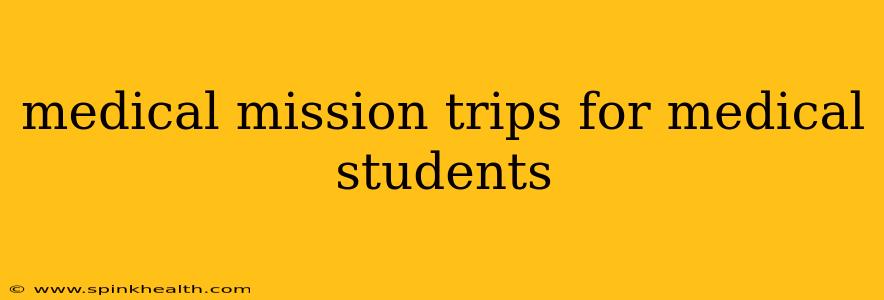Embarking on a Journey of Healing: Medical Mission Trips for Medical Students
The air hung heavy with the scent of woodsmoke and unfamiliar spices. A small child, eyes wide with a mixture of fear and curiosity, clutched her mother's hand. This wasn't a scene from a textbook; this was my reality, a stark contrast to the sterile environment of the medical school lecture hall. I was on a medical mission trip, and it irrevocably changed my perspective on medicine.
For many medical students, the prospect of a medical mission trip seems daunting. The idea of practicing medicine in resource-constrained settings, navigating unfamiliar cultures, and facing challenges beyond the scope of a textbook can be intimidating. But the rewards—both personal and professional—are immeasurable. It's a journey of profound self-discovery, a chance to hone practical skills, and an opportunity to make a tangible difference in the lives of others.
This article will explore the world of medical mission trips for medical students, delving into the practicalities, benefits, and considerations involved. We'll answer some frequently asked questions to help aspiring medical missionaries embark on their own life-changing adventure.
What are the benefits of medical mission trips for medical students?
Medical mission trips offer a unique blend of benefits that extend far beyond simply adding another line to your CV. The experience provides invaluable hands-on experience, allowing students to translate theoretical knowledge into practical application. You'll encounter a wider range of conditions than you're likely to see in a typical clinical rotation, sharpening your diagnostic and treatment skills. Moreover, it's a crucible for developing crucial soft skills—communication, teamwork, adaptability, and resourcefulness—essential for any successful physician.
Beyond the professional benefits, medical mission trips offer immense personal growth. Witnessing firsthand the resilience and strength of communities facing adversity fosters empathy and compassion. It challenges preconceived notions, broadens perspectives, and leaves an indelible mark on your soul. You'll return home with a renewed sense of purpose and a deeper understanding of global health disparities.
How do I find a reputable medical mission trip organization?
Choosing the right organization is paramount. Look for organizations with a strong track record, transparent operations, and a clear commitment to ethical and sustainable practices. Research their mission statement, read testimonials from past participants, and investigate their approach to community engagement. Avoid organizations that prioritize short-term interventions over long-term sustainable solutions. Reputable organizations will often require participants to have a certain level of medical training and experience, ensuring you're prepared for the challenges ahead.
What are the typical roles and responsibilities of medical students on mission trips?
The specific roles and responsibilities will vary depending on the organization and your level of experience. However, you'll likely be working under the supervision of experienced medical professionals. Your tasks may include assisting with patient examinations, providing basic medical care, conducting health screenings, translating (if you are bilingual), and assisting with administrative tasks. Your contributions may not be limited to purely medical ones, as community engagement and participation often extend beyond direct patient care.
What kind of medical skills are needed for medical mission trips?
While prior clinical experience is beneficial, it's not always mandatory. Many organizations welcome pre-clinical students eager to learn and contribute. Basic first aid and CPR skills are essential. Familiarity with common tropical diseases is also valuable. However, the most critical skills are adaptability, teamwork, and cultural sensitivity. The willingness to learn and adapt to unexpected situations is often more important than specific medical expertise. The experience itself will hone your abilities, even if you start with relatively little prior medical experience.
What are the challenges of participating in a medical mission trip?
Medical mission trips are not without challenges. You may encounter language barriers, cultural differences, limited resources, and emotionally demanding situations. The work can be physically and mentally exhausting, and you may encounter conditions outside your area of expertise. However, overcoming these challenges is a significant part of the learning experience, developing your resilience and adaptability. Preparation is key.
Are there medical mission trips specifically for medical students?
Yes! Many organizations specifically cater to medical students, providing opportunities tailored to their skill levels and offering appropriate supervision and mentorship. These programs are designed to maximize the learning experience while ensuring the safety and well-being of both the students and the communities served.
My own medical mission trip was a transformative experience. It wasn't just about providing medical care; it was about building relationships, fostering understanding, and recognizing the shared humanity that binds us all. It's an experience I would wholeheartedly recommend to any medical student seeking to deepen their understanding of medicine, themselves, and the world. The journey may be challenging, but the rewards are immeasurable.

